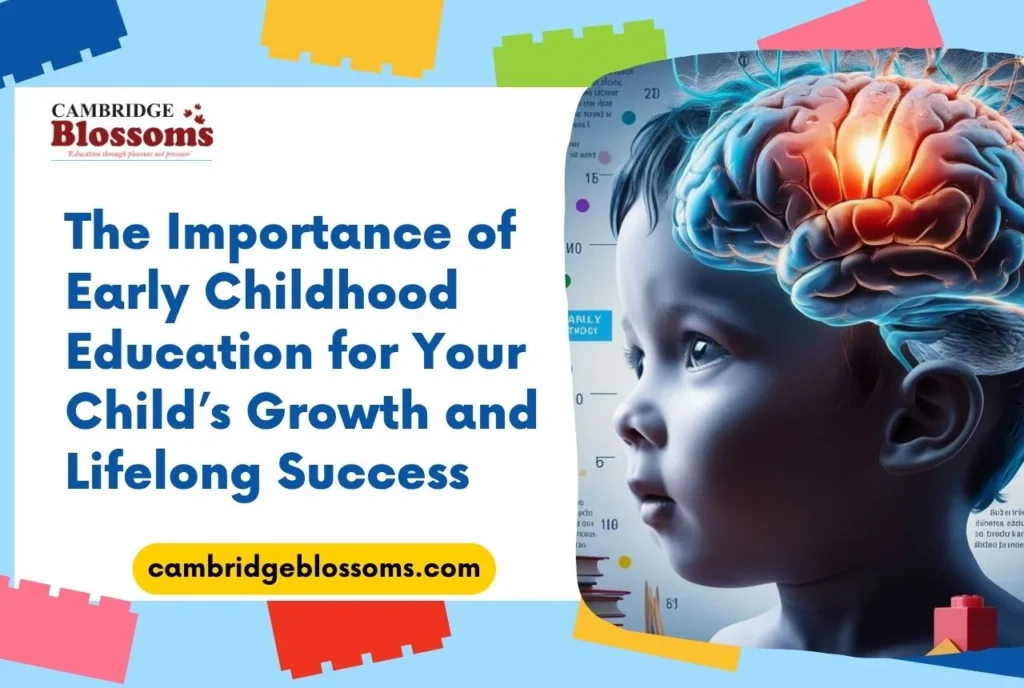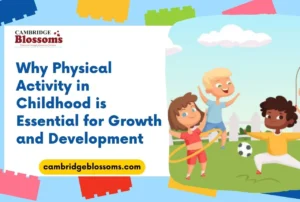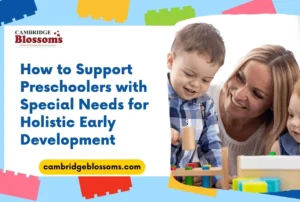The importance of early childhood education (ECE) lies in the formal and informal educational programs and strategies geared toward children from birth to the age of five. These foundational years are considered one of the most critical phases in a person’s life. During this time, children undergo rapid brain development and begin forming the emotional, social, cognitive, and physical skills that shape their lifelong learning and behavior.
Understanding the importance of early childhood education helps parents and caregivers appreciate how powerful the early years are in preparing a child for future academic success, personal growth, and emotional well-being. From play-based activities to structured learning routines, quality ECE programs provide the ideal environment to nurture a child’s curiosity, confidence, and cognitive development.
This blog explores how early education enhances a child’s overall growth and highlights why investing in these formative years offers lifelong benefits.
Building a Strong Brain Development
The human brain develops more in the first five years of life than at any other time. In fact, over 90% of brain growth occurs before the age of five. This period is when millions of neural connections form daily, laying the foundation for thinking, learning, and behavior.
Understanding the importance of early childhood education is crucial, as it provides structured, stimulating experiences that support this rapid brain development. Sensory play, interactive storytelling, singing, and physical activities for preschoolers are not just fun—they are scientifically proven to support synapse formation, memory retention, and problem-solving skills.
A well-designed ECE program helps children make sense of their environment through hands-on discovery, exploration, and interaction. These experiences shape the architecture of the brain, influencing how children absorb knowledge and respond to emotional and social situations.
On the contrary, children who experience neglect or lack enriching activities during these years may struggle with learning and behavior later in life. This further highlights the importance of early childhood education in creating an enriching and emotionally secure environment where the brain can flourish.
Builds Basic Learning and Thinking Skills
One of the core benefits of early education is the introduction to foundational concepts such as numbers, letters, colors, and shapes in developmentally appropriate ways. More than academic instruction, ECE focuses on building cognitive abilities like memory, concentration, decision-making, and analytical thinking.
Through engaging learning tools like puzzles, art projects, role-play, and physical activities for kids, children begin to understand abstract ideas and relationships. Teachers use storytelling, questions, and interactive games to spark curiosity and develop logical thinking.
Importantly, ECE fosters a growth mindset, encouraging children to try, make mistakes, and learn from them. These early problem-solving experiences are directly linked to improved performance in primary school and beyond.
Research consistently shows that children who attend quality preschool programs demonstrate better math and literacy skills in later schooling and are more likely to complete higher levels of education.
Improves Language and Communication
Language acquisition is one of the most visible milestones during early childhood. Between the ages of two and five, children rapidly expand their vocabulary, sentence structure, and communication skills. Early childhood education plays a pivotal role in enhancing this development through exposure to rich language experiences.
Reading aloud, singing rhymes, group conversations, and guided play all contribute to improved vocabulary, grammar, and comprehension. Children also learn to express their thoughts, ask questions, and listen actively—skills that are essential not just for academic success but for effective social interactions.
For children with speech or language delays, early education settings can offer specialized support and early intervention, helping to bridge developmental gaps before formal schooling begins. The ability to communicate confidently enhances a child’s sense of belonging and improves self-esteem, making language a vital component of early learning.
How Early Childhood Supports Social and Emotional Growth
Emotional intelligence and social behavior don’t develop on their own—they are taught and nurtured from an early age. Quality early childhood education environments provide the structure and interactions needed for children to develop essential social and emotional skills.
Children learn to:
- Share and take turns
- Resolve conflicts peacefully
- Understand emotions (both their own and others’)
- Cooperate in groups
- Practice empathy and kindness
Preschool routines such as circle time, group meals, and collaborative play help children adapt to structure and understand boundaries. They learn patience, resilience, and responsibility through small daily interactions.
Positive relationships with caregivers and peers help build trust and emotional security. These early bonds are foundational to mental health and influence how children manage stress and form relationships later in life.
The importance of early childhood education lies in how it promotes emotional regulation and social competence—traits strongly associated with long-term well-being, school engagement, and even workplace success.
Role of Creativity and Curiosity in Early Childhood Development
Children are innately creative and curious. The role of early education is to cultivate that natural sense of wonder through structured yet flexible opportunities for exploration and imagination.
Activities such as painting, building blocks, pretend play, music, and dance foster both creative thinking and emotional expression. They encourage children to explore ideas, solve problems, and take intellectual risks without the fear of failure.
Curiosity is a driving force behind learning. When children are encouraged to ask questions, investigate how things work, and share their discoveries, they begin to develop critical thinking skills and confidence in their abilities.
A supportive learning environment that values creativity helps children become independent thinkers—skills that are crucial in a rapidly changing world where innovation and adaptability are key.
Encouraging physical activities for preschoolers—like outdoor play, yoga, or movement games—also enhances creativity by activating different areas of the brain, helping children connect ideas through action and expression.
Laying the Foundation for a Brighter Future
The importance of early childhood education is rooted in its ability to build a strong and lasting foundation for every area of a child’s development—cognitive, emotional, social, physical, and creative. These formative years are not just about preparing children for school but about equipping them with the tools to navigate life with confidence, resilience, and curiosity.
By choosing a quality early education program, parents are investing in a future where their children can thrive academically, form healthy relationships, and become innovative thinkers and responsible citizens.
From developing language skills and emotional intelligence to nurturing imagination and promoting physical activity, early education sets the stage for a lifetime of growth and learning.
Support your child’s journey by recognizing the powerful and lasting impact of early childhood education—it’s one of the most meaningful steps you can take toward their bright and successful future.




